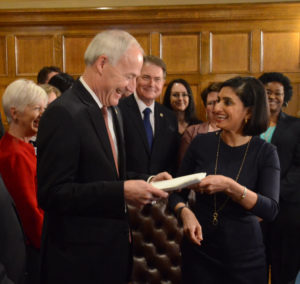
The presidential administration that tried to repeal Obamacare in 2017 just made it easier for some Arkansas legislators to vote to continue part of it.
I guess that’s ironic. But that’s how politics works sometimes.
On Monday, Arkansas was visited by Seema Verna, President Trump’s Centers for Medicare and Medicaid Services administrator. She granted a waiver letting the state require some Arkansas Works beneficiaries to work.
What is Arkansas Works?
Before proceeding, here’s the backstory. Medicaid is the government’s health program for poor people and others in need. It’s largely funded through Uncle Sam and administered by the states following Uncle Sam’s rules. Obamacare expanded Medicaid to Americans with incomes up to 138 percent of the poverty level. The Supreme Court said states could decline to participate. Arkansas instead obtained permission from the Obama administration to buy private insurance for that population. That program is now called Arkansas Works.
It’s been controversial – and the subject of an honest debate – since its beginning. It covers almost 300,000 Arkansans, almost one in 10 of us, and has saved medical providers from providing millions of dollars in uncompensated care. Gov. Asa Hutchinson, who wasn’t governor when it was created, has fought to keep it. But it’s government-funded health care, and some Republicans believe it’s unsustainable.
Legislative opponents don’t have the votes to kill it as a policy. Instead, they’ve tried to block it annually by refusing to fund the agency that administers it, the Department of Human Services’ Division of Medical Services, unless the program is ended. That strategy requires fewer votes because appropriations bills require a three-fourths majority. This session, three of the Senate’s 35 seats were vacant, which made reaching that majority even harder.
Year after year, each session has opened with two questions: Who is a “maybe”? And what will it take to get them to “aye”? This current session was no different.
Except it was, because the “Obama” in Obamacare has been replaced by a Republican, the same party as most Arkansas legislators. And he and Congress have tried to end Obamacare and then, failing that, made changes more acceptable to Republicans.
Why was Seema Verna in Arkansas?
Last year, the state asked the Trump administration to let it require Arkansas Works recipients to work 80 hours a month, or do other work-related activities such as attend school. Hutchinson expected to have that waiver by now. It’s been a big selling point of his – that Arkansas Works won’t be a handout.
As legislators were debating the issue, Verma flew to Little Rock and, in front of the cameras, signed the waiver and handed it to Hutchinson. She also met privately with “maybe” legislators.
Afterwards, the program passed with zero votes to spare in the Senate and four in the House.
What difference does it make?
How much did Verma’s actions contribute? Two vocal Arkansas Works opponents, Sen. Alan Clark, R-Lonsdale, and Sen. Terry Rice, R-Waldron, voted yes after her visit. Both said the work requirement was a factor; Clark said it was “huge.” On the other hand, they had indicated before the session that their hearts weren’t in the fight this time. They knew the funding would eventually pass after a drawn-out ordeal serving no one. There even was talk, if necessary, of legislators returning for a special session once enough Arkansas Works supporters filled the vacant Senate seats. No one wanted to return to the Capitol for that.
Regardless, Verma certainly made it easier for them and others to vote yes. And the Medicaid expansion has survived again.
In Washington, Obamacare wasn’t repealed last year and won’t be this year. Maybe it will never be actually repealed. Instead, we may have reached a point where it’s merely altered, for good or bad, through waivers like the work requirement, and by what smaller measures Congress can pass such as ending the mandate to buy insurance last year. In Arkansas, eventually this annual battle will be replaced by another – about schools or something. Undoubtedly, this year felt different.
The waiver only affects recipients ages 19-49, and the majority already comply or qualify for various exemptions. Still, by June the first batch ages 30-49 must start proving they are working, or doing something.
Will they? And how much will taxpayers actually benefit?
Those are policy questions for another day. These past few weeks, the questions were political: Who was a “maybe”? What would it take to get them to “aye”?
Those questions have been answered, for now.
By Steve Brawner
© 2018 by Steve Brawner Communications, Inc.